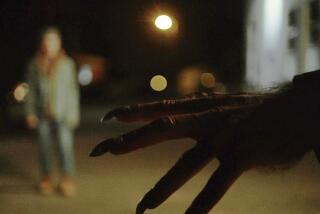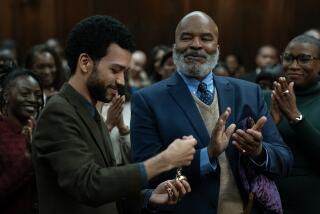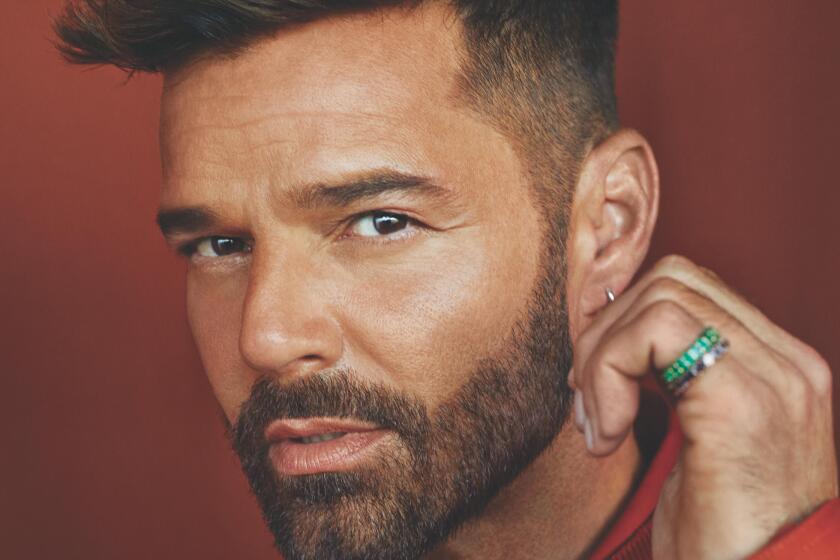The Vampirization of America
In times of political rot and confusion and pain, one needs something like cosmic silliness, not to make sense of things, but for those who don’t expect a life after death, we need an experience, in this life, of the dream of heaven. Tossed into fear, like children, we need a childish vision to restore faith in life. The worse things get, the more we need greater art. Since Pina Bausch wasn’t in town, there was Mozart’s “Magic Flute” at the L.A. Opera not long after 9/11. We needed Mozart because the country was Wagner, pinned to false mythologies of necessary doom.
The genius of that 2001 production was that it felt like it had been put on by a high school with the best singers in the world. It was adolescent joy, with one image that stayed with me. Rodney Gilfry as Papageno the bird catcher, wearing a fool’s cap and bells in a costume with more colors than Joseph’s coat, was singing on stage while a rowboat on wires sailed overhead, carrying three boys dressed like Harry Potter, with his glasses. Young magicians, “Magic Flute,” makes sense.
Who would they put in the boat a decade later? A Harry Potter reference now would seem like product placement, not a little wink.
If we look to the Young Adult shelf now for another character type to use as a little reference point, we find death. In the last decade, the four types being found on the shelves of Young Adult Fiction have replaced all previous human character types. We no longer have anima/animus, ego/id/superego, saint/sinner.
We have Wizards, Werewolves, Zombies and Vampires.
Wizards know that the world is made of light and dark, and struggle to keep faith with the light. They’re a weakened force now, frustrated by the way spells dissipate in time, and too dependent on magic wands and hybrid cars. Ten years ago, children wanted to be Harry Potter, but now they want to be vampires, the type most drawn to power, anything not to be exposed out as a zombie, while the werewolves, like real wolves, are hated and hunted.
Obama was elected by the wizard brigade, a children’s crusade. Obama read “Harry Potter” to his Sasha and Malia. It is inconceivable that he’s reading them the vampire books. The wizards are in bad shape now because, being young wizards, they had too much faith in undefined Hope and not enough clarity about policy and compromise, which is to say, they’d forgotten that the dark side runs through all of us. But who can blame the wizards for wanting to regress, seeing as they do that they’re surrounded now by Zombies, the tea baggers, a growling mob of brain-dead idiots led by the Vampires.
There’s not much to say about the Zombies among us. The Zombies are the muddled herd of the maggoty brain-dead, reduced by their confusion to singular obsessions. What upsets them about Obama’s origins is that he has actual proof of human birth. They are the Living Dead in George Romero’s shopping mall, no money, no credit, still shopping. They’re the embarrassing reflection of our lives, which is why Zombies have changed from nightmare flesh-eaters to comic punch lines, although it’s not really a joke that we’ve set the Zombies on the cover of Jane Austen novels; this is a kind of evil, but again, ours is a culture that resents life, so it makes sense that we’d send emissaries back in time to ruin our heritage with mockery.
Vampires, like wizards, know that the world is made of light and dark, and want to seduce the living into the night. The Vampires are telling us two great seductive lies. There’s the “True Blood” lie: “I don’t need human blood, I have a substitute now.” There’s the “Twilight” lie: “I’m a vegetarian now. Those other Vampires are bad, and the Werewolves are bad, but I’m good, you can trust me, you can love me.”
The Vampires are the aristocracy of the undead, who can, at least, talk. The Vampires are the fear mongers, the talk show hosts, the politicians who can’t find a way to give health insurance to children, much less adults; the bankers, Ponzi schemers, drug company lobbyists, the theologians of prosperity. We can’t understand them without first considering why they’re in a symbolic war against the Lycanthropes.
Toby Barlow’s “Sharp Teeth” has the answer; it’s an epic poem about rival packs of werewolves in L.A. I shouldn’t be surprised it’s not that well-known, because at this moment, in our culture of necrosis, Vampires are sexier than lycanthropes, and as dangerous as werewolves are, they’re still just dogs, and there’s always something to love about dogs. Dogs always have a heart, and more often than not, a good to reason to bite.
The Werewolves are closer to the Wizards than the Zombies, but are maligned by the Vampires. Werewolves are not the undead, they are the humans split between control and abandon, between society and rage. Every politician or sports figure caught for scandal is a werewolf. In the beginning years of this mythology, Bela Lugosi’s Dracula deserved the spike in his heart, he was a mournful villain, but still a villain, while Lon Chaney Jr.’s Wolfman was caught tragically by his blood disease, and knew he needed to die for the protection of those he loved. He was a hybrid, no different in that sense than Spider-Man or the Hulk or a Prius.
The Werewolves are being targeted by the Vampires because that part of them which is still human, and still alive, is the great threat to the Vampires; one may say that the alliance of the Wizards and Werewolves is all that can save us from the Vampires and their army of Zombies.
The love of vampires is the love of death, not a heavenly immortality but a contagious negation of productive life, the equation of sex and death. The symbolic world is splitting between vampire and dog, between those who love death and want to spread it, and those who just want to claim their territory and their pack so they can eat and sleep and hump something once in awhile.
A country led for eight years by torturers has not yet -- and cannot -- produce a work of popular art to make sense of the reasons for these shifts in imagination. We are in a race against the death of posterity, since Zombies have no memory, and Vampires want to kill the most important memory, which is to remember that one is still alive and can choose. The roots of Vampirism are always in the murky past, but American Vampirism isn’t a Romanian import. You can find it in “Huckleberry Finn,” our literature’s greatest insult to the American fantasy of its own nobility, the novel that mocks the great-great-great-grandparents of the tea-bagging zombies, their racism, cruelty, religion and stupidity. Today Twain would call that culture Palinism.
Palinism is vampirism, as she leads her army of Zombies, who refuse to concede that carbon dioxide levels are man-made because they want the world to heat up, because they are cold and dead and want to burn or drown everyone else, because death is jealous of life.
Palinistic Vampirism controls the Zombies, and uses them as proxies to call for the massacre that the Vampires are too clever to ask for themselves. But they do want blood. There is no vegetarian vampire, and vampires are always and only liars. Werewolves, like any dog who steals from the table, may be liars, but unlike the Vampires, they don’t want power. The Vampires can’t be reasoned with.
If there’s any hope, and there always is, their denial of global warming gives them away, shows that underneath the death cult they’re scared, and that fear in its way is proof of their humanity. Science scares them, because they’re afraid of being lost in the leap of imagination to reconcile faith and science. Their fear stupefies them, and they fear the loss of God and the fall into chaos if science is right; they’re too nervous to consider that science is fact and religion is poetry and that there can still be a God, but that he leaves science to us and reserves for himself the right to make up stories and delight himself with metaphor, leaves science to hard work and verification and art to inspiration and effort that needs no proof beyond the way Mozart gives pleasure.
Michael Tolkin is a novelist and screenwriter; among his credits are “The Rapture,” “The Player” and “Nine.”
More to Read
The biggest entertainment stories
Get our big stories about Hollywood, film, television, music, arts, culture and more right in your inbox as soon as they publish.
You may occasionally receive promotional content from the Los Angeles Times.






